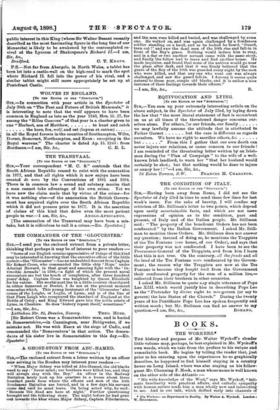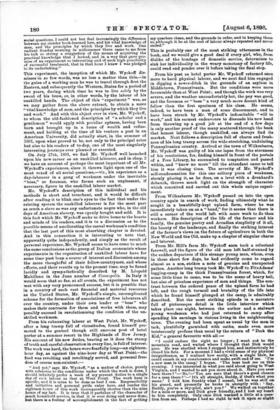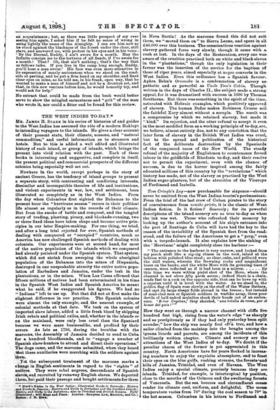BOOKS,
THE WORKERS.*
THE history and purpose of Mr. Walter Wyckoff's slender little volume may, perhaps, be best explained in Mr. Wyckoff's own words, which we take from the preface to his unique and
remarkable book. He begins by telling the reader that, just prior to his entering upon the experiences he so graphically describes, he happened to find himself staying in a country house on Long Island, where was also staying as his fellow-
guest Mr. °banning F. Meek, a man whose name is well known on the other side of the Atlantic :— "His wide knowledge of the West," says Mr. Wyckoff, "inti- mate familiarity with practical affairs, and catholic sympathy with human nature made him a man wholly new and interesting to me. And in our talk, which drifted early into channels of * The Workers: an Experiment in Reality. By Walter A. Wyckoff. Locidon W. Heincroanu.
social questions, I could not but feel increasingly the difference between my slender book-learned lore, and his vital knowledge of men, and the principles by which they live and work. One radiant Sunday morning in midsummer there came to me from his talk so strong a suggestion of the means of acquiring the practical knowledge that I lacked, and in a way that gave pro- mise of an experiment so interesting and of such high possibility of successful treatment, that in that hour I knew I was pledged to its undertaking."
This experiment, the inception of which Mr. Wyckoff dis- misses in so few words, was no less a matter than this,—in the guise of a working man he was to travel through first the
Eastern, and subsequently the Western, States for a period of two years, during which time he was to live solely by the
sweat of his brow, or, in other words, by the labour of his unskilled hands. The object of this "experiment" was, as we may gather from the above extract, to obtain a more "vital knowledge of men, and the principles by which they live
and work." And with this object ever in view, Mr. Wyckoff, to whom the old-fashioned description of "a scholar and a
gentleman" would apply with peculiar aptness, having been born and brought up in a home of wealth and refine- ment, and holding at the time of his venture a post in an American University, did actually start, in the summer of 1891, upon what proved to be, not only to the principal actor but also to his readers of to-day, one of the most singularly interesting journeys ever planned or executed.
On July 27th, 1891, we find Mr. Wyckoff well launched upon his new career as an unskilled labourer, and in chap. 2 we have an account of perhaps the most important of all Mr. Wyckoff's experiences, since it throws light upon one of the most vexed of all social questions,—viz., his experience as a day-labourer in a gang of workmen under the inevitable "boss," or foreman, who forms such an unpleasant, if necessary, figure in the unskilled labour market.
Mr. Wyckoff's description of this individual and his methods is short and trenchant, and it would be difficult after reading it to blink one's eyes to the fact that under the existing system the unskilled labourer is for the most part as much a slave as was any unfortunate negro who, in the old days of American slavery, was openly bought and sold. It is this fact which Mr. Wyckoff seeks to drive home to the hearts and minds of his readers, and it is to a discussion as to the
possible means of ameliorating the casual workman's condition that the last part of this most absorbing chapter is devoted. And in this connection it is interesting to note that, apparently quite independently, and simply as the result of personal experience, Mr. Wyckoff seems to have come to much
the same conclusions as the group of Italian economists whose experiments in the organisation of unskilled labour have for some time past been a source of interest and discussion among the more thoughtful of their fellow-countrymen, and whose efforts, and their results up to the present time, may be found lucidly and sympathetically described by H. Leopold
Mabilleau in the June number of Cosmopolis. In Italy it would seem that so far, at all events, the experiment has not met with any very pronounced success, but it is possible that
in a country of such vast financial and material resources as the United States, Mr. Wyckoff's simple, uncomplicated scheme for the formation of associations of free labourers all over the country, under their own leader or "boss" who makes their contracts for them and works with them, may possibly succeed in revolutionising the condition of the un- skilled workman.
From his exhausting labour at West Point, Mr. Wyckoff, after a long tramp fall of vicissitudes, found himself pro- moted to the genteel though still onerous post of hotel porter at a summer resort in the Highlands of New Jersey. His account of his new duties, bearing as it does the stamp of truth and careful observation in every line, is full of interest. The work was bard, the hours were fearfully long—an eighteen.
hour day, as against the nine-hour day at West Point—the food was revolting and revoltingly served, and personal free- dom of course non-existent
And yet," says Mr. Wyckoff, "as a matter of choice, purely with reference to the conditions under which the work is done, I should infinitely prefer a week of my present duties to a single day of such labour as that at West Point. The work here is specific, and it is mine to be done as best I can. Responsibility and initiative and personal pride enter here, and render the eighteen hours of this work incomparably shorter than the nine hours of my last. It is true that it partakes of the character of much household service, in that it is ever doing and never done, but there is a feeling of accomplishment in the fact of getting my quarters clean, and the grounds in order, and in keeping them so, although it be at the cost of labour always repeated and never ended."
This is probably one of the most striking utterances in the book, and we would give a good deal if every girl, who, from dislike of the bondage of domestic service, determines to sink her individuality in the weary monotony of factory life, could read and ponder over it before taking the final step.
From his post as hotel porter Mr. Wyckoff returned once
more to hard physical labour, and we next find him engaged in digging a sewer-ditch in the grounds of an asylum in
Middletown, Pennsylvania. But the conditions were more favourable than at West Point ; and though the work was very severe, and the weather uncomfortably hot, the pay was good, and the foreman or " boss " a very much more decent kind of fellow than the first specimen of his class. He seems,
indeed, to have been a man of some discernment, and to have been struck by Mr. Wyckoff's indomitable "will to
work," and his earnest endeavours to dissuade his new hand from throwing up a good job at the end of a few days is only another proof of the many scattered through the book that honest labour, though unskilled, can always find its market. Next follows a description full of charm and fresh- ness of his long tramp across the wide-stretching, undulating Pennsylvanian country. Arrived at the town of Wilkesbarre„ Mr. Wyckoff was guilty of his one lapse from the sternness of his resolutions, for, finding himself in front of the portals of a Free Library, he succumbed to temptation and passed within, and "knew no more" till the attendant came to tell him it was closing time. The severity of Mr. Wyckoff's self-condemnation for this one solitary piece of weakness, sternly placing it, as he does, on a level with a drunkard's debauch, throws much light on the strength of character which conceived and carried out this whole unique experi- ment.
From Wilkesbarre Mr. Wyckoff passed on into the open country again in search of work, finding ultimately what he sought in a beautifully-kept upland farm, where he was immediately taken on as a "hand," for it seems that there is still a corner of the world left with more work to do than workers. His description of the life of the farmer and his family, the genuine poetry and Arcadian simplicity of it all, the beauty of the landscape, and finally the striking interest of the farmer's views on the future of agriculture in both the New World and the Old, make up a chapter of singular charm and interest.
From Mr. Hill's farm Mr. Wyckoff soon took a reluctant farewell, and the figure of the old man left half-stunned by the sudden departure of this strange young man, whom, even in these short few days, he had evidently come to regard almost as a son, strikes a note of genuine and unexpected pathos. Another long tramp took Mr. Wyckoff to FitzAdame logging-camp in the thick Pennsylvanian forest, which, for some little time to come, was to be the scene of heavy toil,. but also of priceless experience of men and things. The con- trast between the ordered peace of the upland farm he had left, and the rough turmoil and brutality of the life into which he found himself plunged at the camp, is admirably described. But the most striking episode in a narrative full of picturesque detail is the little interview which takes place one night, between the author and a stalwart young woodsman who had just returned to camp after
spending his earnings in riotous living in the neighbouring town. The evening had been spent as usual by the men in talk, plentifully garnished with oaths, made even more boisterously profane than usual by the return of "Dick the Kid," a general favourite with all :— " I could endure the sight no longer ; I went out to the mountain road, and waited where I thought that Dick would, pass. He was startled when I stopped him, and instinctively he closed his fists. For a moment I had a vivid sense of my physical insignificance, as I realised how easily, with a single blow, he could smash in my countenance and make swift end of me. 'I'm a new man in the camp,' I began. 'The boss took me on this: evening. I was interested in what you said about going to West Virginia, and I wanted to ask you more about it. Have you ever been there ? No.'—' You are sure that there's a good chance,
for a man there ? It's all straight. Buddy, if that's what you
mean.' I told him frankly what I meant, but he was still om his guard, and presently he broke in abruptly with : Say, Buddy, you're a sky-pilot, ain't you ? ' We walked on together for a mile or more, and Dick grew friendly, and I lost my heart to him completely. Only once Dick warmed a little at a ques- tion from me. Perhaps I had no right to ask it upon so slight an acquaintance ; but, as there was little prospect of my ever seeing him again, I asked him if he felt no sense of wrong in using lightly the name of the Almighty. I can see him now as he stood against the blackness of the forest under the clear, still stars, and answered me, with protest in his eyes and in his voice :
By the Eternal, Buddy, I ain't swore for a month. May the Infinite consign me to the tortures of all fiends, if I've swore for s month ! That? Oh, that ain't nothing ; that's the way that as fellows talks. If you live in the camp long enough, Buddy, you'll hear a man swear.' His face was even more attractive in its expression of manly seriousness when we stood on the road- side at parting, and he put a firm hand on my shoulder, and fixed clear eyes on mine, as he told me, in his frank, open way, that he wanted to make a man of himself and not be a drunken sot, and that, in this new venture before him, he would honestly try, and would ask for help."
No extract that could be made from the book would better serve to show the mingled earnestness and " grit " of the man who wrote it, nor could a fitter end be found for this review.




































 Previous page
Previous page